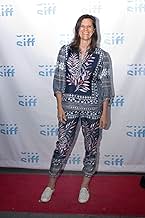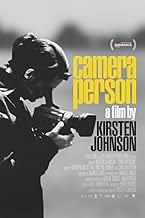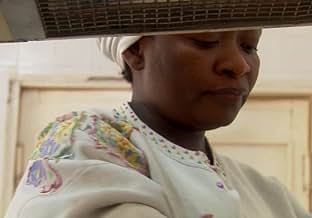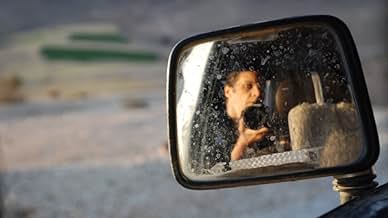IMDb RATING
7.4/10
3.5K
YOUR RATING
Exposing her role behind the camera, Kirsten Johnson reaches into the vast trove of footage she has shot over decades around the world. What emerges is a visually bold memoir and a revelator... Read allExposing her role behind the camera, Kirsten Johnson reaches into the vast trove of footage she has shot over decades around the world. What emerges is a visually bold memoir and a revelatory interrogation of the power of the camera.Exposing her role behind the camera, Kirsten Johnson reaches into the vast trove of footage she has shot over decades around the world. What emerges is a visually bold memoir and a revelatory interrogation of the power of the camera.
- Director
- Writers
- Stars
- Awards
- 23 wins & 38 nominations total
Jacques Derrida
- Self
- (archive footage)
- Director
- Writers
- All cast & crew
- Production, box office & more at IMDbPro
Featured reviews
Cameraperson (2016) is a documentary, directed by Kirsten Johnson, about her own career. Johnson has directed--or done the cinematography--for many documentaries that certainly appear to be extremely interesting. Unfortunately, I haven't seen any of them, so I can't comment directly about her work. She calls Cameraperson an autobiography, but I don't think that's really accurate. We do learn a bit about Johnson and her family in the movie, but mostly we see a patchwork quilt of her work. (I say patchwork quilt because Johnson has presented short segments of her films in seemingly random order.)
Michael Moore--who appears in one of the segments--is a documentary film director who is always in the center of his movies. However, Johnson doesn't seem to appear much in her own films. (One exception is a movie she filmed in Bosnia. She returned five years later to interview the same people, and they treated her like an old friend.)
Johnson is talented, so a short segment of each film whets your appetite. However, each segment is too short to be satisfying. Also, it's hard to learn why she makes documentaries. Is it just what she does, or does she have a political or social agenda? Johnson doesn't tell us, so we have to speculate.
We saw this film at the excellent Little Theatre in Rochester, NY. It will work almost as well on the small screen.
Michael Moore--who appears in one of the segments--is a documentary film director who is always in the center of his movies. However, Johnson doesn't seem to appear much in her own films. (One exception is a movie she filmed in Bosnia. She returned five years later to interview the same people, and they treated her like an old friend.)
Johnson is talented, so a short segment of each film whets your appetite. However, each segment is too short to be satisfying. Also, it's hard to learn why she makes documentaries. Is it just what she does, or does she have a political or social agenda? Johnson doesn't tell us, so we have to speculate.
We saw this film at the excellent Little Theatre in Rochester, NY. It will work almost as well on the small screen.
Kirsten Johnson has been working in the camera department and as cinematographer, producer and director for decades; her first credit, according to the Internet Movie Database, was in 1996. This movie is a series of excerpts from the movies she has handled the camera on, all over the world, from Afghanistan to Serbia, to Brooklyn, to her family. She calls the results onscreen an album, and a betrayal: that you may have someone's permission when filming, but later.... in some ways it is a betrayal: particularly when she films her mother in the grip of Alzheimer's.
But even an album requires organizing. Even if you include everything, the order of each sequence's inclusion affects its meaning; that's the point of the Kuleshov Effect. So what does this movie add up to, what does it say, what does it mean?
That is a question that can only be answered by the audience, the often unremarked component of cinema. A good film maker, a good editor, can often estimate what that result is, but only the audience can say what it is. Theory and practice: try it out and see what the result is. It's experimental cinema. The creator may have an opinion, but, well, at that point, it's no longer Miss Johnson's movie.
But even an album requires organizing. Even if you include everything, the order of each sequence's inclusion affects its meaning; that's the point of the Kuleshov Effect. So what does this movie add up to, what does it say, what does it mean?
That is a question that can only be answered by the audience, the often unremarked component of cinema. A good film maker, a good editor, can often estimate what that result is, but only the audience can say what it is. Theory and practice: try it out and see what the result is. It's experimental cinema. The creator may have an opinion, but, well, at that point, it's no longer Miss Johnson's movie.
I was lucky enough to watch this on the big screen which may have given me a bias to my sheer adoration for this film.
I was moved. I feel this captured the sheer power of cinema to give insight into ways of life we have never seen or experienced. The wonderful eye of Kirsten Johnson guides us through her experiences. Her empathy bleeds through the screen and give you a truly breathtaking documentary.
It gives you a moment to detach yourself from the world. And look at it through someone else's eye.
A documentary that isnt worried about teaching you explicit facts, but more letting you empathise and wonder about this world and all of us who reside here.
I captivated from the very first shot to the end of the credits. I will watch this again.
I was moved. I feel this captured the sheer power of cinema to give insight into ways of life we have never seen or experienced. The wonderful eye of Kirsten Johnson guides us through her experiences. Her empathy bleeds through the screen and give you a truly breathtaking documentary.
It gives you a moment to detach yourself from the world. And look at it through someone else's eye.
A documentary that isnt worried about teaching you explicit facts, but more letting you empathise and wonder about this world and all of us who reside here.
I captivated from the very first shot to the end of the credits. I will watch this again.
'CAMERAPERSON': Three and a Half Stars (Out of Five)
A critically acclaimed documentary, based on the life work of veteran cinematographer Kirsten Johnson. The movie is a collage of samples from all of the different films she's worked on (over several years, in multiple different countries). Johnson also served as the director of the movie, while Doris Baizley and Lisa Freedman are credited as the writers. It has 100% positive reviews on Rotten Tomatoes, and it's considered one of the most critically acclaimed movies of 2016. I think it's a tad overrated, but it is a well made (and beautiful looking) film.
The movie cuts together clips from several different films, all shot by Kirsten Johnson. It cuts back and forth, through the different movies (and through many different scenes), and it takes place over several years, and in several different countries. Johnson uses all of the different selected footage, that she's filmed, to tell a broad story about her life as a cinematographer. She even interviews her mother in it.
I think the film does a good job of showing a very wide selection of many different people's lives, all around the world (and in many different walks of life). It actually reminds me (quite a lot) of the YouTube documentary 'LIFE IN A DAY' (I did like that movie a lot more though). This film feels more aimless; but the individual scenes, on their own, are always interesting. It definitely does a good job of showing how a veteran cinematographer (like Johnson) gets to view the world; and now, thanks to her, so do we.
Watch our movie review show 'MOVIE TALK' review at: https://youtu.be/RO7ghqXHCCY
A critically acclaimed documentary, based on the life work of veteran cinematographer Kirsten Johnson. The movie is a collage of samples from all of the different films she's worked on (over several years, in multiple different countries). Johnson also served as the director of the movie, while Doris Baizley and Lisa Freedman are credited as the writers. It has 100% positive reviews on Rotten Tomatoes, and it's considered one of the most critically acclaimed movies of 2016. I think it's a tad overrated, but it is a well made (and beautiful looking) film.
The movie cuts together clips from several different films, all shot by Kirsten Johnson. It cuts back and forth, through the different movies (and through many different scenes), and it takes place over several years, and in several different countries. Johnson uses all of the different selected footage, that she's filmed, to tell a broad story about her life as a cinematographer. She even interviews her mother in it.
I think the film does a good job of showing a very wide selection of many different people's lives, all around the world (and in many different walks of life). It actually reminds me (quite a lot) of the YouTube documentary 'LIFE IN A DAY' (I did like that movie a lot more though). This film feels more aimless; but the individual scenes, on their own, are always interesting. It definitely does a good job of showing how a veteran cinematographer (like Johnson) gets to view the world; and now, thanks to her, so do we.
Watch our movie review show 'MOVIE TALK' review at: https://youtu.be/RO7ghqXHCCY
"Cameraperson" is recent film by veteran documentary cinematographer Kirsten Johnson. It is composed of several different scenes that were filmed by Johnson over her career for various other documentaries all over the world. The images in this film may be familiar to some members of the audience because they were originally filmed for other documentaries. They aren't all final cuts though; many of them are clips of trying to set up the camera or getting the right angle or frame along with clips from the family life of Kirsten Johnson. The first thing that struck me about this film was how captivating it is from the first frame to the last; I could not look away from the screen no matter how opaque the shot might seem at the moment. The first twenty to thirty minutes or so will have most members of the audience, including myself, confused as to what exactly the point of the images we are seeing is. Patience is required in the viewing of this film. Once it clicks, and you'll know when it does, it becomes all the more engaging. This film tells many stories, not chronologically, but nonetheless effectively and perhaps all the more moving. At its core, "Cameraperson" is an autobiography of Kirsten Johnson. But it is also a meditation on human suffering, the wonder of the world around us, the ethics of nonfiction film, the sadly ironic contrast between the beauty of nature and the extent to which it can be defiled by evil, and an examination of the filmmakers own family. We see her in scenes taking place at her New York apartment, home in Colorado Springs, and far away ranch as she interacts with her mother, a victim of Alzheimer's disease, her father and her twin boys. These scenes are surrounded by scenes of shepherds in the Bosnian Mountains, desert plains, city streets, and government black sites. The ethics of documentary filmmaking, as I mentioned earlier, are also examined. Is it more moving to see images of a body that has been torn to shreds after being dragged by a truck, or to see the chain that dragged him being held by the prosecutor as he speaks about the atrocity? This question is answered in one scene, split in to two parts and book-ending several other scenes. In the first scene, we see the lawyer talking about the book of images that they distributed to the jurors to prevent causing further pain by having to show them in trial. The second comes directly after a conversation had with a film professor as he talks about the depiction of violence in nonfiction film and how it ultimately ends up being disrespectful, becoming entertainment. We then jump to a cut of the cover of the book of photos; we no longer want to see what's inside as we did before. Bringing attention to the art of filmmaking is also a theme in the film, particularly in recognizing the technical aspects of filmmaking. Most people don't think much about the cinematographer when they think about a great film. Shots are attributed to the director, but this film brings a special attention to the person behind the camera making all the shots work, and staring directly through the lens of the camera into the eyes of human beings. In film, especially nonfiction film, the cinematographer is responsible for establishing the human connection between the audience and the subject. "Cameraperson" does this especially beautifully because at the end of the film, we are able to see how the experiences and people Johnson has filmed connect her to them, us to them and her to us. This is an autobiography not merely because it is a compilation of the footage that has touched her throughout her extensive career, although it is that, but because she has her own story that is also full of pain, loss, love and life just like those she connects with as a Cameraperson.
"Cameraperson" is directed and photographed by Kirsten Johnson, distributed by Janus Films and released by Criterion. It had its premiere on January 26th at the 2016 Sundance Film Festival. It is not rated. I gave it four out of four stars.
"Cameraperson" is directed and photographed by Kirsten Johnson, distributed by Janus Films and released by Criterion. It had its premiere on January 26th at the 2016 Sundance Film Festival. It is not rated. I gave it four out of four stars.
Did you know
- TriviaThis film is part of the Criterion Collection, spine #853.
- Quotes
Kirsten Johnson: He's coming and he's mad.
- ConnectionsFeatured in The Story of Film: A New Generation (2021)
- How long is Cameraperson?Powered by Alexa
Details
Box office
- Gross US & Canada
- $102,033
- Opening weekend US & Canada
- $12,760
- Sep 11, 2016
- Gross worldwide
- $109,464
- Runtime1 hour 42 minutes
- Color
- Sound mix
- Aspect ratio
- 1.78 : 1
Contribute to this page
Suggest an edit or add missing content
























